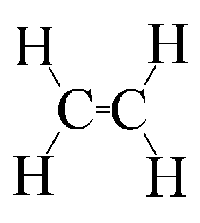
chemkid - 21-9-2007 at 14:33
I read about thermal decomposition of polyethylene to yield ethylene gas and of course dehydration of ethanol using sulfuric acid. However, would it
be possible to perform the same thermal decomposition on polypropylene or other alkene polymers? Any information on either depolymerization would be
great.
chemkid
chromium - 22-9-2007 at 05:23
AFAIK pyrolysis of polyolefins normally yields long list of various hydrocarbons. I did some experimenting once and impression of this short touch
was that to get anything usefull from it one has to be very skilled in separation science.
Things might be better if some catalyst is used which shortens the list of possible products or makes one prevail over all others. Does anyone know
of catalyst which could just depolymerise polyolefins on heating?
chemkid - 22-9-2007 at 05:24
sulfuric acid?
YT2095 - 22-9-2007 at 07:24
I`ve distiled expanded polystyrene before when I was a kid, it make a liquid that stay liquid.
Lord knows what it was though 
not_important - 22-9-2007 at 07:54
It was mostly styrene, with small amouns of ethylbenzene, toluene, benzene, and likely di and trimers of styrene.
Polystyrene and the poly-acrylic acid esters, such as methyl methacrylic acid (Lucite, Plexyglas), do undergo fairly clean thermal depolymerisation.
Yields of monomers are typically in the 80 to 95 percent range.
Poly vinyl chloride and other related halo-polyethylenes mostly give HCl and unsaturated polymers, then carbon and a mixture of small hydrocarbons.
The ainyl esters, such as vinyl acetate, behave in similar fashion.
Poly-olefins generally give fairly complex mixtures of hydrocarbons, especially in the case of polyethylene.
If you concider that polyethylene is basically a chain of CH2 units, you can see that there are no 'special' positions that would favour chain
fragmentation at that point. Polystyrene, on the other hand, has a benzylic carbon at every other atom in the backbone, giving a repeating pattern of
reactive positions.
Nicodem - 22-9-2007 at 07:59
The thermolysis of polyethylene would be fairly equivalent to the so called petroleum cracking. Essencially it is about homolytic thermal cracking of C-C bonds to the apropriate radicals which recombine, disproportionate,
etc., to lower parafins. Ethene is indeed one of the products.
chemkid - 23-9-2007 at 11:12
Well I'll be dehydrating some ethanol then. Thank you for your responses.
Chemkid
497 - 26-6-2012 at 16:46
These are very valuable reference for anyone interested in getting valuable products from waste polymers!
http://www.docstoc.com/docs/50868604/Feedstock-Recycling-and...
http://gbhint.tripod.com/papers_5_13_02/368_Beyler_Hirschler...
Sorry, I couldn't find the more recent thread regarding polymer depolymerization.
[Edited on 27-6-2012 by 497]
SulfurApothecary - 28-6-2012 at 13:51
It sounds very plausable condsidering that if it worked something like cracking petrol, it would seem viable, but I do not no, I can only speculate.
http://onlinelibrary.wiley.com/doi/10.1002/pol.1968.15006021... this is a link that would be vauluable if you had acess to it.
Polyethylene structure is like this, and it is formed by the polymerzation of ethylene.

Thermal decomposition/cracking would lead to this, which is ethylene:

This would seem to work as the when the polymer was broken the carbon would be forced to make a double bond with the carbon next to it in order to
retain four bonds to each carbon.
[Edited on 28-6-2012 by SulfurApothecary]
[Edited on 28-6-2012 by SulfurApothecary]



